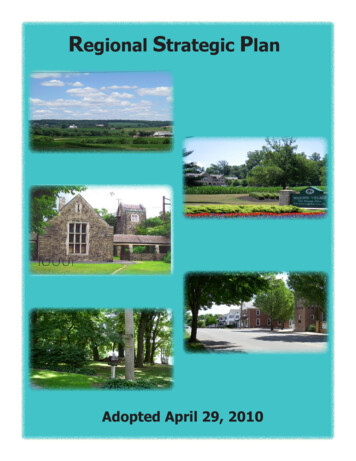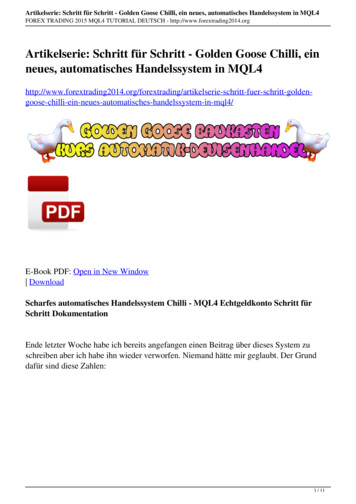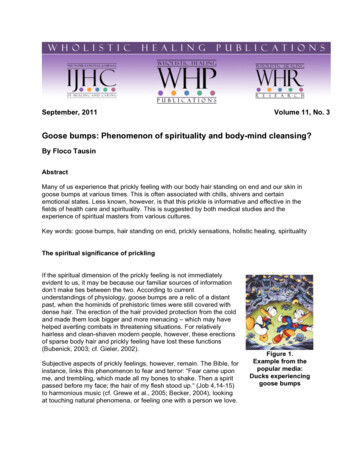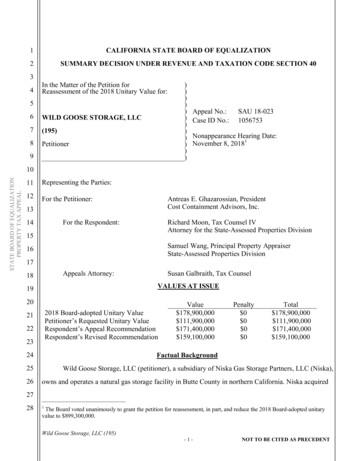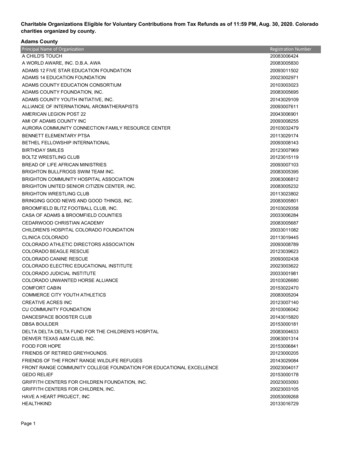
Transcription
Goose Creek SC NAACP Branch #56A3 April 2011 Newsletter Volume 6, Edition 4NAACP joins civil rights and other groups to protest SC budgetThousands rally to Stop the Cuts and Fund a Moral BudgetThousands of people, includingmembers of the Goose CreekNAACP branch, gathered Saturday March 12th on the northside of the South CarolinaState Capital to call on thelegislature to Stop the Cutsand Fund a Moral Budget.That’s why the SC Conference of NAACPBranches and more than 2,000 people fromacross the state gathered to ask lawmakersto adopt a moral budget.An anticipated 700 millionshortfall in the state budget thisyear has led lawmakers to consider deep cutsto public education, Medicaid, and other stateprograms that mostly serve children, thepoor, elderly and disabled.Calling for a moral budget is asking legislators for a budget that is going to be realisticand just and fair. Don’t shift the burden ofdeficit reduction onto middle and lower classcitizens and public workers.While some governors are pushing for progressive revenue raisers, in addition to steepspending cuts, to reduce these budget gaps.For instance, Governors Brian Schweitzer (D-We want the lawmakers to pass a moralbudget and Stop the Cuts to needed programs when the answer is more revenuethrough fair tax reform.The Tax Realignment Commission reportedlast year the state is missing out on millionsof dollars in revenue because of special interest tax breaks, exemptions, deductions andcredits. 59% of South Carolinians pay one of We collect 300 on the sale of a 1989 5,000 Chieftain Winnebago. We collect 300 on a 2007 - 130,000 CoachHouse Platinum Recreational Vehicle –a 7,500 exemption. { 7.9 million}Stop The Cuts Continued on Page 2BRANCH MEETINGS Dayand Location ChangedGoose Creek NAACP now meetsthe fourth Monday of the month at:Berkeley Electric Building2 Springhall DriveGoose Creek, SC.Our next meeting is 7PMMonday March 28thInside This IssuePhoto by Jean G. StricklerMT), Mark Dayton (D-MN), and Dan Malloy(D-CT) have all proposed closing corporatetax loopholes and cutting special interest taxbreaks to bring more revenue into theirstates. On the other hand Gov. Nikki Haleyhas proposed ending the state's corporateincome tax corporate income tax, even whileshe calls for cutting education funding andMedicaid.the nation’s top income tax rates, while 41%pay no taxes (6th highest rate in US).The state is not broken, our current system of taxation is! For example: We collect 90 (6%) sales tax on a 15model airplane, but we cap the tax on amillion dollar Lear jet at 300 -a 59,700tax exemption. { 1.2 million}April 2011 - Page 1Rally for a Moral Budget. .1Announcements . 2Highlights of March 7th Meeting . .3Donna DeWitt SC AFL-CIO . .4Photos from Rally . .5Community Events . . 6Health Awareness .7Message from Planned Parenthood.8Jackie Hicks, SCEA Remarks . .9Message from President Jealous .10NAACP News 11Civil War Sesquicentennial. .l2
Page 21NAACP CREEK CONNECTIONBRANCH MEETINGS Day and Location ChangedGoose Creek NAACP meets the fourth Mondayof the month at Berkeley Electric Building2 Springhall Drive; Goose Creek, SC.Upcoming Meetings7:00 PM to 8:00 PM General MeetingMonday April 22, 20117:00 PM to 8:00 PM General MeetingMonday March 28, 2011Goose Creek Branch NAACPPO Box 1356Goose Creek, SC 29445-1356Telephone: 843-276-6294www.naacpgoosecreek.orgEmail: info@naacpgoosecreek.org102nd NAACP Annual ConventionNAACP: Affirming America's PromiseOfficersPresident . David Cakley1st VP . .James Dukes2nd VP The Rev. Ted AdamsSecretary Herbert Bodison, JrTreasurer . William WatsonLos Angeles Convention Center1201 S Figueroa StreetLos Angeles, California 90015Executive Committee MembersConvention Housing Information will be available March 2011Eddie AndersonRanese HarrellBrenda Bines Watson Orville HayesKenneth BrownThomas LanierJuly 23 - 28, 2011For ALL NAACP CONVENTION RELATED INQUIRIEScall the Events Planning Department at 410-580-5780.Stop The Cuts from Page 1Our current system of taxation is mishmashfrom tax cuts and tax shifts in good years thathave left the state deficient in revenuesources.We’re calling for Gov. Nikki Haley and S.C.legislators to pass a moral budget that addresses the needs of the poor and vulnerabledespite tough economic times.See keynote messages of SC AFL-CIOPresident Donna DeWitt on page4 and SCEducation Association President JackieHicks on page 9. April 2011 - Page 2
Page 3NAACP CREEK CONNECTIONMarch 7th NAACP Goose Creek Branch MeetingCity of Goose Creek Police Chief Harvey Becker and Investigator Micah Fogle were in attendance to kick offNational Consumer Protection Week. Chief Becker updated the branch on police issues in Goose Creek andindicated the City of Goose Creek is looking to hire more police officers. We were encourage to spread theword to those who may be looking to join the City of Goose Creek Police Department. He also open answeredquestions from those in the audience.Investigator Micah Fogle gave a presentation on Identity Theft that was very informative and helpful.During the meeting the branch voted to change the general meeting day from 7PM the first Monday of themonth to 7PM the fourth Monday of the month. In addition the location was changed from Abraham Masonicbuilding to Berkeley Electric Cooperative located at 2 Springhall Drive, Goose Creek.Our next branch meeting will be 7PM Monday March 28that Berkeley Electric CooperativeSpecial thanks to City of Goose Creek PoliceChief Harvey Becker and Investigator Micah Foglebelow who gave a presentation on Identity Theft.Photos provided by Ken BrownApril 2011 - Page 3
Page 41NAACP CREEK CONNECTIONWe Stand in SolidaritySouth Carolina AFL-CIO President Donna DeWittat theMoral Budget Rally, Saturday, March 12, 2011We stand today to demand a moral conscientiousness of our elected officials to protect ourmost vulnerable citizens and the workers thateducate them, care for them and provide theservices needed to make our cities, states, nations and countries work. Today we are all Wisconsin, Ohio, Indiana, NY, CA, Libya and Egypt.As our forefathers in other lands declared toPharaoh and other slave owners and by the 13thamendment of our nation’s Constitution proclaimed, we are a free people, owning our on labor.Last week in an unusual display on bi-partisanship, members of the SCLegislative Black Caucus and Republican leadership of the HouseWays and Means reported the SC Health Insurance Exchange bill,introduced by Representative Harold Mitchell, Greenville, out of a subcommittee. Now, the Governor, who has encouraged bi-partisanship,needs to allow legislators to do their job.Today the members of the SC AFL-CIOand Change to Win stand with our fellowworkers, neighbors and friends in solidarity. You may not recognize us, but if youread a newspaper or magazine, drank acan Coke, rode in on a highway with cement or crossed a steel bridge, more thanlikely you can thank a United Steel Workers (USW) member in SC. If you rode thecity bus, you can thank an AmalgamatedTransit Workers (ATWU) member. Fromthe tires on your vehicle to the hands thatput it together, thank a United AutoWorker (UAW or United Food and Commercial Worker (UFCW) member in SC.Chances are your electricity is provided by an International Brotherhood of Electrical Workers (IBEW) member- and your phone service bya Communications Workers of America (CWA) or IBEW member. All ofthe products are shipped to you or from your hands to other placesthrough our SC ports by International Longshoreman Association (ILA),by rail by members of International Brotherhood of Teamsters (IBT),United Transportation Union (UTU) and other rail members. They aredelivered to your homes and businesses that are protected by a growing number of International Association of Fire Fighters (IAFF), who notonly risk their life, but far too often in a state that does not recognizefederal laws of safety- give their lives to protect you. Your mail wastaken off of trucks by members of the Mail handlers, sorted and delivered by American Postal Workers Union (APWU) and Letter carriers.Many of these buildings around you were constructed by members ofthe SC Building Trades, plumbers, electrical workers, Sheet metal andIronworkers, the crane operators of International Union of OperatingEngineers (IUOE), the Elevator and Asbestos workers and, yes, thisbeautiful State House was painted by International Union of Paintersand Allied Trades (IUPAT). The stages and services of many of ourstates most utilized venues are built and maintained by members ofInternational Association of Theatrical Stage Employees (IATSE). Notonly do members of the Charleston Symphony perform, but as American Federation of Musicians (AFM) some serve on the SymphonyBoard. Services provided to our states military bases, prisons, SocialSecurity and veterans are by members of American Federation of Government Employees (AFGE) and many maintained by Office Professional Employees International Union (OPEIU) and other unions. If youfly, your reservationists was more than likely a union member and youcan feel safe if an International Association of Machinists (IAM) serviced your plane. Your attendant more than likely is an Airline FlightAttendants (AFA) member, your pilot an Airline Pilots Association(ALPA) member. Your plane is guided on and off the ground by amember of Professional Airways Safety Specialists (PASS). And don'tforget to encourage those folks you know who are TSA employees thatthey are eligible to vote now to be a proudmember of AFGE. You'll be able to fly onthe airline that is the envy of all airlineunion contracts beginning March 15 in SC.Yes, South West, you know the one thattold SC officials they didn't need a subsidyin Charleston. If you are a Carolina Panthers fan please support the players.These players are dedicated to their professions, but sacrifice their ability to live along productive life for the job they love.They were unable to reach an agreementwith the 32 team owners, who made over9 billion dollars last year. If you're a baseball fan you can thank OPEIU that represents all of the minor league umpires in our SC teams.We take your hand and join with you and raise them to our Creator andask that in addition to our rights that a true moral conscientiousnesswill be recognized by the leaders of our nations and that the people willbe empowered to make it happen, as they did in the time of Moses.We are at our Red Sea and, while there are those who think they areGod, we, the working people, have the ability to recognize the one thatwill take us to the Promised Land. You see, we are the people thatmake these lands work and in words more gentle than my friend,Kenny Riley, we can make it cease to work.Solidarity forever! April 2011 - Page 4
Page 5CREEKCONNECTIONPhotos fromNAACPRally to Stopthe Cutsand Fund a Moral Budget!Photos by Jean G. Strickler on the steps of the SC State CapitalEditor gives special thanks toJean G. Strickler for these photosApril 2011 - Page 5
NAACP1The Charleston Chapter Chums, IncPresentsA Spring LuncheonTheme: “Girls to Women: It Takes A Village”11:30 to 2:30 - April 30, 2011Page 6THE YWCA TAKES A STAND AGAINST RACISMOver 250,000 individuals expected to take a Stand Against RacismThe YWCA would like your support - for the "Stand Against Racism"that will take place on Friday, April 29th from 10:00 to 2:00 pm at theYWCA. The “Stand Against Racism” is the program of the YWCAaimed at raising awareness that racism still exists in our communitiesand that it can no longer be ignored or tolerated.According to the Southern Poverty Law Center (SPLC’) the number ofhate groups operating in the United States has grown by 56% in thelast eight years (there are almost 1,000 active hate groups in the UnitedStates today).Mt Moriah Family Life Center7396 Rivers AvenueNorth Charleston, SC 29419Honorees are: The Honorable Veronica Small, Dr Sherron Jackson, Ms Cecelia Rogers, Ms Paige Weldon, Ms Shelby Jones andMs Christina Lin Brown, musical entertainment, a silent auction,presentations and door prizesPlease join usIn response, the YWCA created the Stand Against Racism in order tocombat the spread of hate and intolerance, and to honor and celebratethe richness of diversity.Organizations are urged to visit www.StandAgainstRacism.org to jointhis important movement.Contact: Marge Williams(843) 863-0240For more information contact:Kathleen Rodgers, YWCA Executive Director at 843-722-1644 orvia email at rodgerskywca@bellsouth.net"At the River I Stand" to be shown April 4thBerkeley County Teacher of the Year BreakfastTickets - 35/Adults - 25/Youth up to 18yrsThe Charleston Labor Council will be showing "At theRiver I Stand" 7PM April 4th at the ILA Hall. The 1993film chronicles the AFSCME Memphis Sanitation workers strike in 1968, where Dr. Martin Luther King Jr.gave his famous “I have been to the mountaintop”speech. Dr. King was assassinated the following day."An excellent film on the movement which drew Martin Luther King toMemphis and his death. It reveals how the Black and labor movementsboth win by struggling together!"7:30am Thursday, April 7thTrident Technical College7000 Rivers Avenue, Building 920North CharlestonJoin us as we recognize Berkeley County's outstanding educators and officially announce the newBerkeley County Teacher of the Year.Cost: FreeJulian Bond, Chairman Emeritus, NAACPInternational Longshoremen Association (ILA) Hall Located at:1142 Morrison Drive; Charleston, SCRSVP 577-9549, 761-8238, or nruss@bcoc.com oronline at www.berkeleysc.orgApril 2011 - Page 6
NAACP CREEK CONNECTIONPage 7Eliminating Health Disparities: An NAACP Strategic PriorityApril is National Minority Health MonthHonoring the Negro Health MovementHistorically, African-American leaders recognized the link between health and social/economic well-being. In 1914, Booker T. Washington started Negro Health Improvement Week,which became the National Negro Health Movement. The first National Negro Health Week wasrecognized in April 1915. Health clinics and hospitals were involved and the health movementreached large audiences through faith-based,school, and community activities. The movementincluded health sermons, health talks, meetings, speakers, music,community clean–up’s, health screenings, family activities, surveysand data collection, conferences, newspaper articles, and radio andTV broadcasts. This movement ended in 1951, but in April 2001, theNational Minority Health Month Foundation and the federal Office ofMinority Health launched National Minority Health Month.This bit of history reminds us that our health challenges have existedfor a long time and they need our constant attention so that futuregenerations will not have these same problems. While the NationalNegro Health Week ended 50 years ago, its significance is still honored today. To the best of our knowledge, Negro Health Week wasthe beginning of the minority health movement in the US.Just as Booker T. Washington believed that the health of black America was tied to its economic progress and social acceptance into thebroader society, we believe that the health status of black people isstill indelibly bound to the role African Americans play in the nationtoday and their role in our country's future. Advances in medical science have not removed the possibility that a large segment of blackAmerica will continue to suffer from preventable death while standingin the shadow of a medical wonder world. Over sixty years ago, National Negro Health News stated: "It is a time for remembering thehealth of the race and how essential it is to our racial progress. Thereis no better time to think of this than now, when we shall need everyracial resource to make the progress we should make in these days."We call upon public health professionals to examine our history forguidance and to join with the black community now in an inter-racialcoalition to promote health and prevent disease among African Americans.When we accept the moral imperative to improve the health status ofpoorly served, under served and never served segments of our society, we truly demonstrate the principles of public health as social justice. From this perspective, the National Negro Health Week represents a significant contribution from African Americans to the historyof public health. “Clearing Up the Confusion”By Dr. Thaddeus John Bell, MDOver the past few years, we have attempted to educate underservedmen about the importance of getting a colonoscopy and prostateevaluation. Some men think the two exams are identical and are veryconfused, so let me clear things up.The colonoscopy is usually done by a gastroenterologist, whose onlyinterest is the colon, and requires going through the rectum, a sectionof the colon. The gastroenterologist is looking for evidence of canceror other diseases that are harmful to the patient. If early evidence, inthe form of a polyp(s) is detected, it is removed and sent for evaluation. Polyps are precursors to cancer and if removed early, can prevent cancer. The colonoscopy is done at age 50 and every five yearsthereafter for most patients, however, if there is a family history ofcolon cancer, the examination should be done earlier. Recent research has revealed that African American men are less likely to getthe exam when compared to Caucasian men and the reason is probably twofold. Some patients may not be advised to get the examinationand some patients, who are advised, refuse to get the examination.The prostate examination, known as the digital rectal examination(DRE), is done by a urologist or family practice physician and is performed in the rectum by using a finger to feel or examine the prostate.The other part of the prostate evaluation is known as the prostaticspecific antigen (PSA) which is a blood test. The DRE and the PSAare usually done annually, starting at age 40. If there is a family history (father, brother, uncle, grandfather) of prostate cancer, surveillance for prostate cancer should start earlier than age 40. Recently,the DRE and PSA have come under close medical scrutiny and somephysicians are questioning the screening guidelines as improving theoutcome and being cost effective. In other words, some physicians donot recommend annual evaluations, particularly for African Americanmen. I continue to recommend the examination annually for men untilage 75.Now that the confusion has been laid to rest, spread the word to menyou know about the importance of having both examinations. I am Dr.Thaddeus John Bell closing the gap in health care for African Americans and the underserved.To learn more about Dr. Bell and Closing The Gap InHealthcare or see the latest videos from Dr. Bell, visitwww.ClosingTheGapInHealthcare.com April 2011 - Page 7
NAACP CREEK CONNECTIONPage 81Message to the NAACP from Planned Parenthood Health SystemsPlanned Parenthood Health Systems is a partner with the NAACP to promote and protectthe civil and human rights of all persons in the United States. We work together towardthe goal of a more open and just society – an America as good as its ideals.At Planned Parenthood, we’re proud to servewomen, men and teens of all backgrounds whocome to us for affordable, quality healthcare.The doctors, nurses and health professionalsof Planned Parenthood work every day to ensure that our patients receive the lifesavingpreventive care they need to lead healthy andproductive lives.Though we are a trusted abortion provider,more than 90 percent of the health care provided at Planned Parenthood health centers ispreventive in nature. Each year, the doctorsand nurses in our 800-plus health centersacross the country provide affordable contraception for nearly 2.5 million patients, nearlyone million cervical cancer screenings,830,000 breast exams, and nearly four milliontests and treatments for sexually transmittedinfections, including half a million HIV tests.We are an essential safety net provider in thecommunities in which we work—our servicesprovide a lifeline for millions of women wholack other sources of basic health care. Six inten patients who receive care at a women’shealth center like Planned Parenthood consider it their main source of health care.Three-quarters of Planned Parenthood healthcenter clients live on the equivalent of 33,000a year for a family of four (150% of the federalpoverty level) or less. Many are uninsured orunderinsured.For almost 100 years, Planned Parenthood hasfought for a health care system that treats allpeople with dignity and delivers excellenthealth outcomes for all. Increasing access toaffordable, culturally competent preventivecare is one step toward eliminating the alarming reproductive health disparities that persistamong communities of color and are particularly stark in South Carolina. African-Americanwomen are more likely to be uninsured or underinsured than white women, and they oftenare forced to delay care because they lack theresources to pay for it. Ultimately, they experience higher rates of illness and mortality as aresult of the inequities in our health care system. Here are just a few statistics: whitewomen have a greater risk of developingbreast cancer than African-American women,but African-American women diagnosed withbreast cancer are more likely to die of thedisease. African-Americans have eight timesthe incidence of Chlamydia (a common sexually transmitted disease which can damage awoman's reproductive organs), 18 times theincidence of gonorrhea and six times theincidence of syphilis compared to whites.South Carolina ranks fourth in the country forthe proportion of persons living with AIDSwho are African-American (73 percent). African-American women experience higherrates of unintended pregnancy and, as aresult, higher rates of abortion.In recent years, instead of working with reproductive health advocates to address theseinequalities, individuals and organizationsopposed to legal abortion have resorted todivisive messages based on race to furthertheir agenda. The most widely publicizedeffort is the “Black Children are an Endangered Species” billboards put up in Atlantalast year. Most recently, billboards appearedin New York with the message “The mostdangerous place for an African-Americanchild is in the womb.” These messages suggest that comparatively higher abortion ratesin African-American communities are theresult of insidious targeting by providers likePlanned Parenthood. That’s completely inaccurate. Planned Parenthood health centersprovide affordable health care to everywoman who comes to us, regardless of herrace or ethnic background. Planned Parenthood views these billboards as a reprehensible attack on the right of African-Americanwomen to make deeply personal medicaldecisions based on the advice of doctors inconsultation with loved ones and in accordance with their faith. They obscure blackwomen’s agency and trivialize the very realviolence and discrimination that threatensAfrican- American children in the UnitedApril 2011 - Page 8States.I do want to be clear: Planned Parenthoodfounder, Margaret Sanger, did make statements nearly a century ago on the issue ofeugenics that were wrong then and are stillwrong today. These ideas have never beenpart of Planned Parenthood’s mission or thecare it offers to women of every community.The abhorrent history of eugenics, whenwomen—many of whom were AfricanAmerican—were forcibly sterilized androbbed of their ability to have children, is astark reminder that real reproductive freedom is not just about abortion, but about theability to decide when and if to become aparent, and the right to parent your childrenwhen you choose to have them. In SouthCarolina, there is much work left to do tomake reproductive freedom a reality.When the South Carolina legislature addresses reproductive health issues, it isusually only to launch divisive attacks onaccess to abortion care. We’re committed topartnering with the NAACP to change theconversation in South Carolina to prevention. Investing in family planning, mandatingcomprehensive sexuality education, fullyimplementing health care reform, providingsupport for the testing and treatment ofsexually transmitted infections, reducinginfant mortality rates, increasing access toand education about the HPV vaccine toprevent cervical cancer, and ensuring thatfamilies have the support they need to raisehealthy children are all areas in which ourstate government can and should do better.We look forward to increasing collaborationbetween our two organizations and engaging in a dialogue on how to achieve betterreproductive health outcomes for all SouthCarolinians.Jessica Bearden Laurenz is the Director ofPublic Policy for Planned Parenthood HealthSystems. She can be reached at jessica.bearden@pphsinc.org
NAACP CREEK CONNECTIONPage 9Stop the Cuts. Find the Money. Create a Moral Budget RallySCEA President-elect Jackie HicksMarch 12, 2011Remarks from Podium on South Carolina State CapitalWow, what a crowd! Let me give a shout out toall The SCEA members who are here.It’s great to see so many school employeeshere, standing up.standing together.standing tall. to tell our legislators Stop the cuts! The money is here. Fund amoral budget! Be fiscally responsible!Last year, the legislature said “Our state’s taxsystem is broken.” They said, “We have afiscal crisis.” “We must find a better way to raise the revenue our stateneeds.” It established a commission and called on this TRAC commission to develop a plan to reform the way we raise revenues.What happened to that commission? Why are we again planning toshortchange our children instead of reforming our taxes?!?I don’t know about you, but I’msick and tired of hearing “Wedon’t have any money.” That isnot true. We have the money inSouth Carolina. Where there isa will there is a way. We mustfind the will to raise the moneyfor our children’s sake. If wehave no money, why are legislators contemplating a new privateschool voucher scheme? Itwould cost millions of dollars.That’s not being a good stewardof the state’s funds.Second, a moral budget is one that finds the resources its citizensneed to survive. And it finds those resources in a way that is fair to allresidents.For too long, we have let special interests use big tax loopholes to skirttheir responsibilities. Last year alone we lost billions of dollars becauseof special interest tax loopholes. I call that an immoral budget. Thisyear, let’s close the loopholes and reform our taxes!Third, a moral budget must raise more revenue from those who canwell afford it and less from those who cannot.For too long, our sales tax has taken a huge bite out of the budgets ofmiddle class families. But we’ve capped the sales tax so the rich payproportionately little for their Mercedes and yachts. Last year we lostmillions of dollars because of the sales tax cap. I call that an immoralbudget. This year, let’s remove that cap and reform our taxes!Finally, a moral budget is onethat safeguards our children’sfuture. For the last three years,our budget has shortchanged ourchildren. It has increased classsize and reduced the school yearto the point where children arestruggling to learn. I call that animmoral budget. This year, let’sfund the educational programsthat our children will need to getgood jobs and support themselves.We need tax reform that willallow us to create a moralbudget.Now will you help me send thismessage to our legislators? Joinme now:Stop the Cuts. The money isWhat, some ask, is a moral budget?here. Fund a Moral Budget!For me as a Christian, a moral budget is first and foremost one thatputs the poor, the disabled, and our most vulnerable citizens first.Stop the Cuts. The money is here. Fund a Moral Budget!In one of my favorite verses, Luke 9:48, the Bible tells us how Jesuswants us to treat our children, particularly the poorest of our children:“ and He said to them, ‘Whoever receives this child in My name receives Me for the one who is least among all of you, this is the onewho is great.’”Thank you for your courage and your sacrifice to be here today. Andthanks for everything you do for South Carolina’s children! For three years, our state budget has cut school programs that servethe poor and the disabled. It has cut budgets for schools in our poorestcommunities. I call that an immoral budget. This year, let’s put ourchildren’s needs first.April 2011 - Page 9
NAACP CREEK CONNECTIONPage 101We Are OneSign the pledge today: http://action.naacp.org/WeAreOnePledgeWe are facing unprecedented, coordinated attacks on our civilrights across the country.defending our sisters' and brothers' established rights from attack.In recent months, we have witnessed attempts in North Carolinato amend state policy to accelerate the re-segregation of its public schools, a widespread assault on voting rights -- including aneffort in Florida that would take up to 300,000 voters off the rolls,continued attacks on the rights of women and immigrants inaddition to the well-publicized offensive on the rights to organized labor.Two generations ago, in the midst of the Great Depression, mycollege-educated grandfather worked as the fourth cook on theB&O Railroad, raising a family in the McCulloh housing projectsin Baltimore, Maryland. Black, educated, discriminated againstand poor, my grandfather understood all too well that civil rightsand economic rights are crucial, and inseparable. It steeled inhim the resolve to see our country overcome the twin sins ofracial discrimination and massive poverty.This is one coordinated attack, and our response must be aunited one. That's why we need you to pledge to defend civilrights -- wherever they are threatened, whatever form that threattakes. Join the NAACP today in saying: We Are One.It is the duty of all of us to protect the civil and economic rightsthat have done so m
Hicks on page 9. Stop The Cuts from Page 1 . In addition the location was changed from Abraham Masonic . Photos by Jean G. Strickler on the steps of the SC State Capital Editor gives special thanks to Jean G. Strickler for these photos . 1 April 2011 - Page 6 NA ACP Page 6 The Charleston Chapter Chums, Inc
